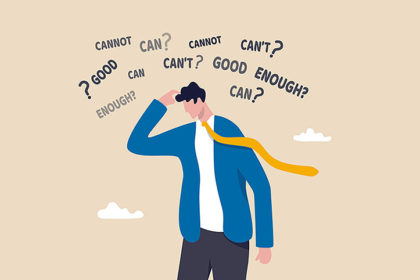The term “burnout” is getting thrown around a lot as people become more and more aware of their mental health. Usually, when we talk about people being burned out, it’s due to toxic work environments, but it can also happen when you’re younger. If you don’t take proper care of yourself, you can be in danger of burning out while still in school.
Particularly bad burnout can drastically change you, and before you know it, you’re a completely different person. I’ve seen firsthand how badly someone can overload themselves and basically implode, and it’s not pretty and not something anyone wants to go through.
What is burnout?
The exact definition and symptoms are a little fuzzy. The best way to explain it is mental exhaustion to the absolute extreme. You don’t care about anything, you can barely muster the motivation to put one foot in front of the other, and you just feel empty and overwhelmed all the time.
Even when you do feel something, it’s usually stress. The biggest contributing factor to mental exhaustion is stress. That prolonged stress can lead to other mental health concerns, like anxiety and depression.
It doesn’t help that it can be hard to tell at first since burnout and depression share a lot of overlapping symptoms. Things like long periods of sadness, low self-esteem, self-isolation (pulling away from friends and family), mood swings, and sometimes even lack of interest in your favorite activities.
Luckily burnout isn’t incurable, and unlike most other mental health conditions, it is usually manageable without therapy or medication (though they can certainly help).
Recognizing the signs in yourself
Noticing gradual changes in your mental health isn’t an easy thing to do. It’s like that old saying about a frog in a pot of boiling water. The frog will jump out if you just drop it in because of the stark contrast. If you slowly heat the water, though, the frog will let itself be boiled alive (which I’ve heard is not true, either way, be kind to frogs, please).
When something sudden comes and starts stressing you out, it’s easy to recognize and take measures to relax and unburden yourself. When gradual stressors pile up, though, it can be easy not to realize when the water is getting too hot.
If you notice one or more of the following, you might want to examine just how mentally exhausted you are.
- Feeling tired all the time, no matter how much sleep you get
- Having a hard time getting excited about anything
- Getting headaches constantly
- Always feeling like you have no control over your life
- Feeling numb
- Lashing out at others over the smallest things
There are lots of symptoms of burnout. You may experience one or all of them, but even if you don’t feel like you’re mentally exhausted, it’s never a bad idea to take stock of where your head is at and think about taking a break to let yourself recharge.
Recovering from burnout
If you feel like you’ve reached the brink of mental exhaustion, it’s time to step back from your regular responsibilities and take back some control. Trudging on without changing anything isn’t going to help and can make things worse in the long run.
Work and school are especially tough to manage at times. If you’ve got a tough job or intensive school schedule, your mental health could be in trouble. Thankfully there are a few ways to recover and prevent overloading your brain in the future.
Manage stress
Stress is the biggest factor contributing to mental exhaustion, so evaluating the sources of stress in your life is very important. After you’ve evaluated the sources of your stress, you can try to get rid of them or at least start figuring out coping strategies. Take a mental health day to try some out or use a weekend. The sooner you deal with your stress, the sooner you’ll start feeling better.
Common ways to reduce stress:
- Get lost in your favorite hobby
- Take up meditation/ yoga
- Take care of yourself by eating and sleeping well
- Avoid drugs and alcohol
- Spend quality time with others
It might take some time to find the best way to destress, but with some trial and error, you’ll be able to find what works best for you.
Get support
Making connections with others is the absolute best way to improve your mental health (aside from therapy). Having people there to support you when you need it or just being around when you want them is a huge mood booster. Even making new friends works if you don’t currently have anyone around you.
I myself am an introvert, but I still deeply appreciate the people I met during my first year of college. Without them, an already tough adjustment period would have been 100x times worse.
You don’t need to open up about anything deep to feel connected to others. In fact, just goofing off can be a great way to unwind and forget about your worries. So next time you’re feeling overwhelmed, take a break and invite some people out to go to a new bookstore or something. It will take your mind off of things, and you might make a new friend.
Set routines
Having daily routines can get a little boring sometimes, but it does help make your life feel a little more stable too. If you can get into self-care routines, that’s even better. Regularly doing things like exercising, brushing your teeth, eating healthily, and sleeping enough are all going to help your mental health.
There is some comfort in setting and sticking to routines. Even when you feel like your life is out of your control, you can at least choose when and what your routines are and find joy in the little things.
Setting routines can also help you organize your schedule and better manage your time. It’s kind of amazing how little things like that can improve your mental health and general outlook.
Preventing burnout in the future
No one wants to deal with extreme mental exhaustion. It’s a lot of work to pull yourself back from that brink, so it’s a much smarter idea just to prevent it altogether. The big thing to do is to take care of yourself and check in on your own mental health every once in a while. Understand how hot the water is getting so you know when to turn down the heat.
Plan mental health days
Build out time to recover from the stress in your life. Take a bubble bath, find a cat café, binge your favorite comfort movie. Prioritize a day off outside of your normal weekends where you just get to do the things that make you feel good.
If you’re still unsure about mental health days, check out our blog on how we all need them. Don’t go crazy with them but make sure you take the time for yourself.
Take breaks
Make sure you’re taking smaller breaks regularly, especially when you’re trying to work through something frustrating. I know it can be tempting just to try to power through a difficult homework assignment or grind out a work project by 5pm. Taking small breaks during the process, though, makes it overall a lot less frustrating and allows you to look at everything with fresh eyes.
It will be a lot easier to finish things up when you’re not fighting a primal scream because things aren’t going your way. Been there, and it’s not fun.
Change your environment (if you can)
Sometimes, despite our best efforts, there are environments we just can’t thrive in. Maybe you don’t get along with your boss no matter what you do, or you just can’t wrap your head around a certain subject at school. There’s only so much stress a mental health day can relieve, so in the worst-case scenario, do what you can to get away from your stressors.
Find a new job or switch to a new class. It may not always be possible, but most of the time, you’ll be able to figure something out. Having a new environment will do wonders for your mental health and is going to be the best way to avoid burning out in the future.
If you’re feeling burned out, know that you’re not alone. One survey reported that 75% of people have felt burned out at work. You won’t feel this way forever, though, and if you take the time to care for yourself and your mental health, you can prevent yourself from feeling this way again.
How do you relieve stress when you’re feeling burned out?




